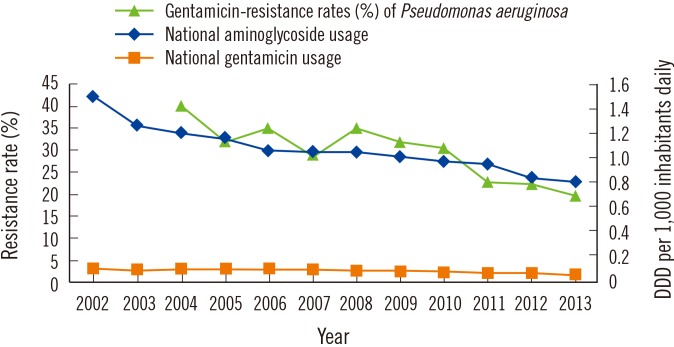Ann Lab Med.
2018 Mar;38(2):176-178. 10.3343/alm.2018.38.2.176.
Correlation of Aminoglycoside Consumption and Amikacin- or Gentamicin-Resistant Pseudomonas aeruginosa in Long-Term Nationwide Analysis: Is Antibiotic Cycling an Effective Policy for Reducing Antimicrobial Resistance?
- Affiliations
-
- 1Department of Laboratory Medicine, National Health Insurance Service Ilsan Hospital, Goyang, Korea.
- 2Department of Internal Medicine, National Health Insurance Service Ilsan Hospital, Goyang, Korea.
- 3Department of Statistics, Korea University, Seoul, Korea.
- 4Department of Laboratory Medicine and Research Institute of Bacterial Resistance, Yonsei University College of Medicine, Seoul, Korea. hmlee.labmed@gmail.com
- KMID: 2403366
- DOI: http://doi.org/10.3343/alm.2018.38.2.176
Abstract
- No abstract available.
MeSH Terms
Figure
Reference
-
1. Yoon YK, Park GC, An H, Chun BC, Sohn JW, Kim MJ. Trends of Antibiotic Consumption in Korea According to National Reimbursement Data (2008-2012): A Population-Based Epidemiologic Study. Medicine (Baltimore). 2015; 94:e2100. PMID: 26579825.2. Yong D, Shin HB, Kim YK, Cho J, Lee WG, Ha GY, et al. Increase in the Prevalence of Carbapenem-Resistant Acinetobacter Isolates and Ampicillin-Resistant Non-Typhoidal Salmonella Species in Korea: A KONSAR Study Conducted in 2011. Infect Chemother. 2014; 46:84–93. PMID: 25024870.3. Ku NS, Choi JY, Yong D, Kim JM, Lee K. Correlations between aminoglycoside consumption and aminoglycoside resistance in Gram-negative bacteria at a tertiary-care hospital in South Korea from 2001 to 2011. Int J Antimicrob Agents. 2013; 41:394–395. PMID: 23305659.4. Almaghrabi R, Clancy CJ, Doi Y, Hao B, Chen L, Shields RK, et al. Carbapenem-resistant Klebsiella pneumoniae strains exhibit diversity in aminoglycoside-modifying enzymes, which exert differing effects on plazomicin and other agents. Antimicrob Agents Chemother. 2014; 58:4443–4451. PMID: 24867988.5. Lee J, Lee JS, Park S, Shin SA, Kim KW. Cohort Profile: The National Health Insurance Service–National Sample Cohort (NHIS-NSC), South Korea. Int J Epidemiol. 2017; 46:e15. PMID: 26822938.6. Korea Centers for Disease Control. Korean Antimicrobial Resistance Monitoring System 2013 Annual Report. last visited on 19 June 2017. http://cdc.go.kr/CDC/cms/cmsFile-Download.jsp?fid=136&cid=21224&fieldName=attachGrp&index=5.7. Wachino J. Exogenously acquired 16S rRNA methyltransferases found in aminoglycoside-resistant pathogenic Gram-negative bacteria: an update. Drug Resist Updat. 2012; 15:133–148. PMID: 22673098.8. Young EJ, Sewell CM, Koza MA, Clarridge JE. Antibiotic resistance patterns during aminoglycoside restriction. Am J Med Sci. 1985; 290:223–227. PMID: 3936358.9. Gerding DN. Aminoglycoside resistance in Gram-negative bacilli during increased amikacin use. Comparison of experience in 14 United States hospitals with experience in the Minneapolis Veterans Administration Medical Center. Am J Med. 1985; 79:1–7.10. Lai CC, Wang CY, Chu CC, Tan CK, Lu CL, Lee Y, et al. Correlation between antibiotic consumption and resistance of Gram-negative bacteria causing healthcare-associated infections at a university hospital in Taiwan from 2000 to 2009. J Antimicrob Chemother. 2011; 66:1374–1382. PMID: 21436153.
- Full Text Links
- Actions
-
Cited
- CITED
-
- Close
- Share
- Similar articles
-
- In Vitro Activity of Antimicrobial Combination against Multidrug-Resistant Pseudomonas aeruginosa, Korea
- Antimicrobial Resistance and Clones of Acinetobacter Species and Pseudomonas aeruginosa
- Gentamicin-resistant Pseudonomas Aeruginosa Menigitis
- Antimicrobial Susceptibility and Clonal Distribution of the Blood Isolates of Pseudomonas aeruginosa from Two Korean Hospitals
- Antimicrobial Resistance among Clinical Isolates of Pseudomonas aeruginosa from Non-tertiary Care Hospitals in Korea, 2002-2004



